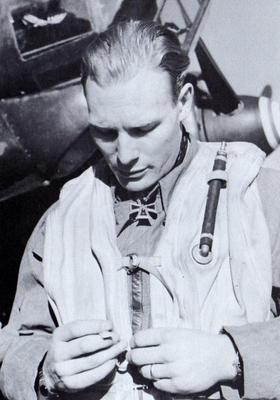<Back to Index>
- Aeronautics Pioneer George Cayley, 1773
- Composer William Marshall, 1748
- Commander of the Luftwaffe Battle Wing 200 Werner Baumbach, 1916
PAGE SPONSOR



Werner Baumbach (December 27, 1916 – October 20, 1953) was a bomber pilot in the German Luftwaffe during World War II and commander of the secret bomber wing Kampfgeschwader 200 (KG 200). He received the Knight's Cross of the Iron Cross with Oak Leaves and Swords (Ritterkreuz des Eisernen Kreuzes mit Eichenlaub und Schwertern) for the destruction of over 300,000 gross register tons (GRT) of allied shipping.
Born on December 27, 1916, in Cloppenburg, Baumbach entered the Luftwaffe in 1936 and was trained as a bomber pilot. He was one of the first pilots to fly the Junkers Ju 88 bomber and flew various bombing missions with Kampfgeschwader 30 (KG 30). On 19 April 1940 he bombed and damaged the French cruiser Émile Bertin for which he was awarded the Iron Cross 1st Class. In 1942, Baumbach was removed from active pilot duty and started working on new bomber designs; among others, he helped design the composite bomber system Mistel. In 1944, he was placed in command of the newly formed KG 200 and was in charge of all Luftwaffe special missions. Baumbach was promoted to Oberstleutnant on 15 November 1944 and was tasked with leading the affairs of the General der Kampfflieger.
After the war, Baumbach spent three years as a prisoner of war before he moved to Argentina where he worked as a test pilot. He died in a plane crash on 20 October 1953 while evaluating a British Lancaster bomber. He was interred in his hometown Cloppenburg.
Baumbach released his memoirs, Zu spät: Aufstieg und Untergang der deutschen Luftwaffe (English title: "Broken Swastika"), in the late 1940s. The book demonstrates that even after Germany's defeat, Baumbach still believed to a very large extent in the National Socialist ideology. The fact that Baumbach's time as commander of KG 200 is not mentioned with a single word highlights the extreme secrecy of Germany's special missions program.